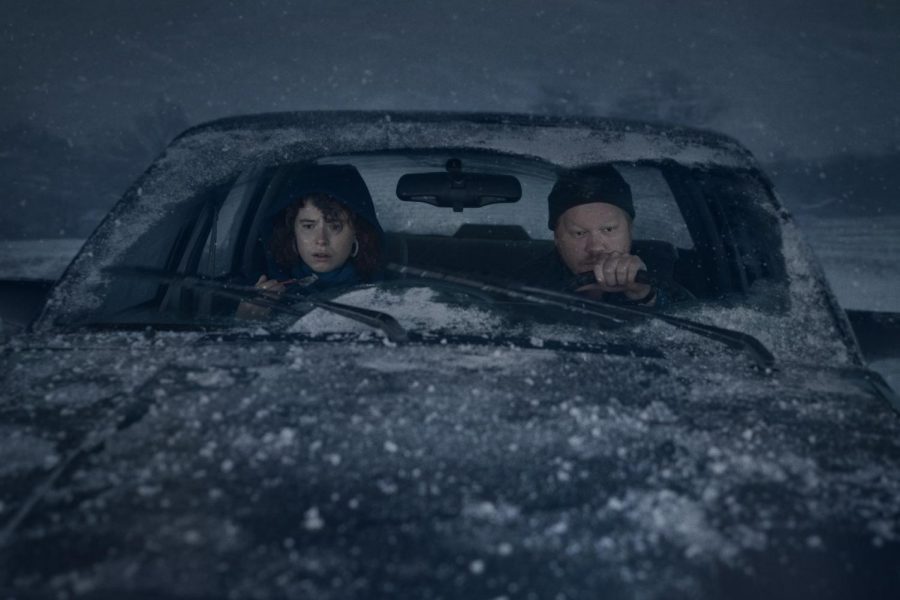REVIEW: “I’m Thinking of Ending Things” is a cinematic brain freeze
Mary Cybulski/NETFLIX
Jessie Buckley and Jessie Plemons in a scene from “I’m Thinking of Ending Things.”
Netflix has come a long way from its early days as a DVD rental service. Not only do they have what is perhaps the most well-known streaming service for film and television in the world—they now consistently distribute some of the most daring and compelling narrative films in recent memory—with the likes of Beasts of No Nation, Okja, Roma, and Marriage Story springing to mind. With their steady position in the industry, Netflix has discovered a willpower to greenlight projects that dare to be different; so it is with Charlie Kaufman’s latest foray into cerebral cinema, I’m Thinking of Ending Things, a film that is perhaps the least accessible film to the general public that Netflix has ever released—which in turn makes it their most exciting original film to date.
Based on the novel of the same name by Iain Reid, I’m Thinking Of Ending Things follows a character referred to by the film’s script as Young Woman (Jessie Buckley). This woman, a college-educated gerontologist, accompanies her boyfriend Jake (Jesse Plemons) to visit his parents (Toni Colette and David Thewlis) who live on an Oklahoma farm far away from the city. As Young Woman ruminates on the notion of breaking up with Jake and a blizzard begins to coat the ground in layers of snow, she discovers, through her experiences at the farmhouse, that things are not what they seem to be.
The film exists as a sharp contrast from Charlie Kaufman’s most well-known cinematic work, Eternal Sunshine of the Spotless Mind. Both films seek to portray the human psyche through visual means, but each film does so for a different purpose—and that purpose surrounds the theme of a couple’s love. Eternal Sunshine sees the imperfections within a couple and shows them as they lose one another and do everything they can to gain each other back; Ending Things, on the other hand, shows its couple as seemingly committed—while acknowledging that something beneath the relationship’s surface is wrong. Eternal Sunshine effervescently explores memory after memory of the man (played by Jim Carrey), giving audiences a glimpse of the impact the woman (played by Kate Winslet) had on his life, as well as how the woman’s presence has painted his life in a new shade of color.
But Ending Things, without the narrative excuse of memory erasure, allows Young Woman to interact with Jake’s parents at different ages of their lives; and in another moment, the camera watches her as she walks down a staircase and across a hallway—only to refuse cutting away as she walks the down the same stairs and hallway again, and again, and again and again. These deeply psychological moments of the film seek to reveal Young Woman’s inner wrestling with the implications of a sustained relationship with Jake—and the repetition of her walking down the stairs serves to accentuate her indecision.
Therefore, Charlie Kaufman has crafted an intellectual puzzle of a film, one much colder in tone and theme than the vibrant Eternal Sunshine, that uses its striking cinematography, precise framing and overall attention to detail for the expressed purpose of explaining the central couple’s relationship through the visual language of cinema alone. Of course, one would be remiss to suggest that they were explained through visuals alone, as the film’s verbose and zestful dialogue adds another language to the explanation—though that is to be expected with knowledge of the screenwriter’s past works. The film spends much of its runtime observing the couple’s conversations as they drive through the snowy darkness of the Oklahoma roads—and the couple’s verbal interplay colors their relationship in a bevy of emotion.
Speaking of the story’s central couple, each character’s actor is perhaps giving the performance of their lifetime. Jessie Buckley, coming red hot off of star-making turns in Chernobyl and Wild Rose, is utterly chameleonic in the role of Young Woman, absorbing the points of view and demeanor of another identity before the very eyes of the audience. Jesse Plemons, on the other hand, shines in a “tortured genius” type of role, boasting the emotional range of a virtuoso.
I’m Thinking Of Ending Things will likely stand as one of the most thought-provoking cinematic works of 2020. The film is not for all audiences, as its slow-burn nature and esoteric creative decisions are almost guaranteed to alienate some viewers. Despite its quirks, discerning film enthusiasts should be encouraged to give this film a shot—and Netflix, of course, should be encouraged to greenlight more films like it or at least more film projects that possess even half of its creative audacity.








